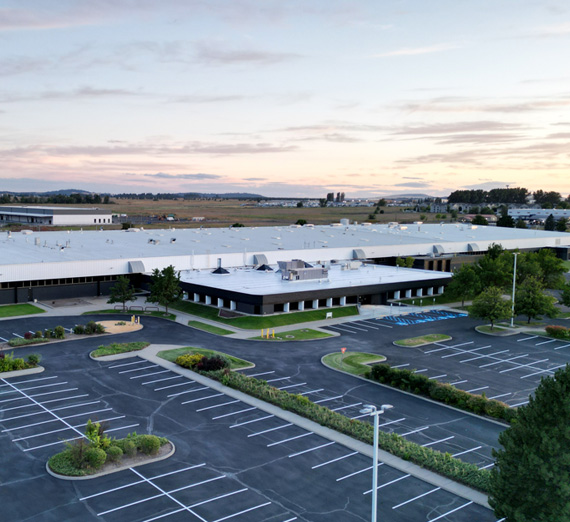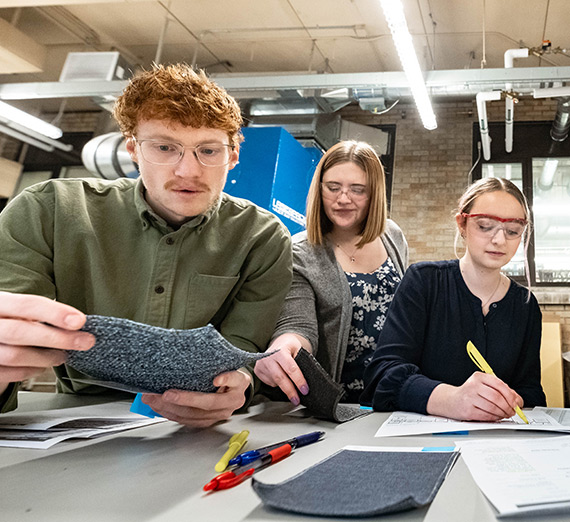GU-led Tech Hub Consortium Discusses Progress With Washington Gov. Jay Inslee

Washington Gov. Jay Inslee visited the Gonzaga campus to meet with members of a consortium led by GU and Lakeside Companies of Post Falls working to bring a Regional Technology and Innovation Hub to the Inland Northwest.
A successful Tech Hub designation would create myriad jobs in the aerospace and aviation fields as well as delivering educational opportunities, economic development and enhanced partnerships across higher education, regional governments, tribal communities and more.
There are more than 50 organizations in the Inland Northwest Consortium that successfully navigated the first stage of the designation process last fall, becoming one of just 31 groups among 198 applications to reach the second round. The Inland Northwest Consortium is in contention for up to $75 million in federal funding to launch the American Aerospace Materials Manufacturing Center near Spokane International Airport, which would manufacture light-weight composites for commercial aircraft. A final decision on the project from the Economic Development Administration is expected in late summer.
Gonzaga President Thayne McCulloh moderated the discussion designed to get Inslee up to speed on all the work consortium members have been doing to pursue the unique opportunity to provide the Inland Northwest with its next generation of high-tech aerospace innovation.
“We are so grateful for the support of so many different entities, ranging from government to education, the city of Spokane, our colleagues in North Idaho, our tribal nations and so many in the higher education space,” McCulloh said at the meeting’s outset.
The members of the consortium, McCulloh noted, are a powerful group coming together to focus on furthering aerospace and the manufacturing economy across the Inland Northwest that will enable “our state and our region to continue to be the best place in the world to build airplanes.”
Inslee was quick to point out the deep history Washington state has in aerospace and aviation manufacturing, while praising the Inland Northwest in particular for strides it’s made in evolving along with technology to support important regional industries and educating much-needed workers in high-tech fields.
“There is something happening in eastern Washington. Spokane County, obviously, but the entire eastern section of our state is developing an advancement of the high-tech economy that’s going on, and this is one of the central pillars of that development,” Inslee said.
“I think we’re on to something really good here, and I’m here to listen to how the state of Washington can help advance this cause, particularly to have the skillset we know is going to be needed, mostly by our young people, and developing these high-tech solutions.”
Among the consortium partners on hand for Inslee’s visit were Spokane Mayor Lisa Brown, Avista CEO Dennis Vermillion, Spokane Tribe of Indians Acting Executive Director Joni Wynecoop, Lakeside Companies’ Marketing Manager Nick Roach, Community Colleges of Spokane Chancellor Kevin Brockbank, Greater Spokane Inc. VP of Economic Development Gary Ballew, Coeur d’Alene Area Economic Development Corporation President Gynii Gilliam, Machinists Institute Executive Director Shana Peschek, Kalispel Tribal Economic Authority CFO Jason Beasley and West Plains Economic Development Corp. Executive Director Chris Pengra.
As different members of the consortium told Inslee about their contribution to the pursuit of the Tech Hub, the depth and breadth of this unprecedented collaboration truly came into focus. Roach talked about the Lakeside building on the West Plains ready to house the center for manufacturing, research and development. Brown spoke of the city of Spokane’s prioritizing of the Tech Hub and efforts to streamline any regulatory hurdles.
Brockbank talked of existing educational programs at the community colleges, and potential new ones. Ballew, Vermillion and Wynecoop all spoke of workforce development, and a desire to strengthen partnerships throughout the region.
McCulloh echoed that focus on workforce development, noting that it is a major component of the Tech Hub application and that the various partners involved are working together “so that we can ensure that we’re meeting the demands of industry with a workforce that’s been appropriately trained for the next generation of manufacturing.”
While advancing to the next round toward a Tech Hub designation is challenging, McCulloh noted that in researching some of the other applicants, the Inland Northwest Consortium’s effort fills a need that others simply don’t.
“This is a unique opportunity, not only for the Inland Northwest, but nationally,” McCulloh said. “There is no other Tech Hub that is specifically focused on aerospace manufacturing. Most of them are focused on other industries. So really what we’re doing here is acknowledging that for many years aircraft components have been developed in this region, and that there is an opportunity and a thirst for what we believe is growth and development as a result.”
- Careers & Outcomes
- Academics
- President's Office
- Academic Vice President



